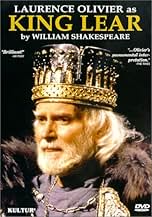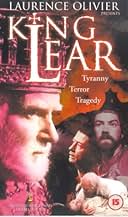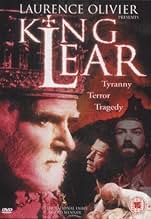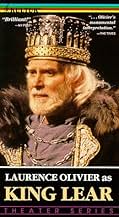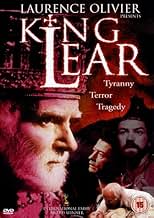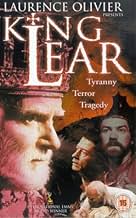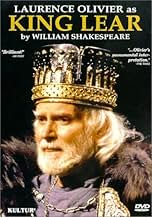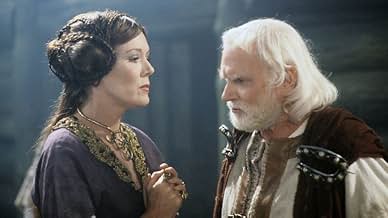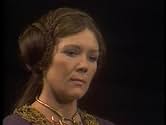Aging King Lear invites disaster when he abdicates to his two disloyal and obsequious daughters while rejecting the one who truly loves him.Aging King Lear invites disaster when he abdicates to his two disloyal and obsequious daughters while rejecting the one who truly loves him.Aging King Lear invites disaster when he abdicates to his two disloyal and obsequious daughters while rejecting the one who truly loves him.
- Won 1 Primetime Emmy
- 2 wins & 3 nominations total
- Director
- Writer
- All cast & crew
- Production, box office & more at IMDbPro
Storyline
Did you know
- TriviaEsmond Knight (Old Man) previously appeared in all three Shakespearean films directed by Laurence Olivier: Henry V (1944), Hamlet (1948) and Richard III (1955).
- ConnectionsFeatured in The 36th Annual Primetime Emmy Awards (1984)
Featured review
I am becoming increasingly aware that some of my favorite actors are just dumb, that they don't have a vision as grand as the work they are a part of. I don't know that this should be so surprising, given what it takes to be an actor.
Olivier both acts and directs here, and what we have is a shame because he just doesn't understand this play, the important half anyway. Half of the play is about the relationships among people, specifically about the parent-child relationship and its regal surrogate of fealty (the fool, Kent and Gloucester to the King). When Olivier is relating to one of these, he is marvelous.
But half of the play is about Lear's relationship to unseen demons, sprites, devils. He sees and relates to these as intensely and with as much duration as with the daughters. (This is mirrored by Gloucester who cannot see them.) In this part of the play, roughly the middle, the language comes alive as it takes us into the Elizabethan equivalent of science fiction. This is some of the best language in Shakespeare, which is to say the best stuff anywhere.
And what does Olivier give us? Mumbling, sometimes under the wind noise. The fulcrum of this magic is the sequence with the Fool and Poor Tom. It is the heart of the magic, which Shakespeare later amplified with the `trial.' Olivier cuts most of that, and gives us a muddle. (Literally, Tom wallowing in the mud.)
The music is horrid, as it is with his much earlier Hamlet. The swordplay is bombastic. The sets are cheesy, especially the faux Stonehenge. If he understood the importance of Stonehenge, why drop the notion of magic in the core of the play? I just don't get it: I don't understand how he couldn't get it.
At the very last page, Lear kneels over the dead Cordelia and says `my poor fool is hanged.' Then looking for life in a magical revival asks to have HER button undone, which likely undoes a garment like that we have seen on the long-lost Fool. Rich stuff that, as big a twist as `Sixth Sense.' But Olivier slurs over on his way to rambling about dogs and rats and then asks for HIS button to be undone. My my.
Advice: Lear is one of the very best of the plays. I'll grant that Olivier is a fine actor, but this is a very poor offering indeed. Ignore.
Olivier both acts and directs here, and what we have is a shame because he just doesn't understand this play, the important half anyway. Half of the play is about the relationships among people, specifically about the parent-child relationship and its regal surrogate of fealty (the fool, Kent and Gloucester to the King). When Olivier is relating to one of these, he is marvelous.
But half of the play is about Lear's relationship to unseen demons, sprites, devils. He sees and relates to these as intensely and with as much duration as with the daughters. (This is mirrored by Gloucester who cannot see them.) In this part of the play, roughly the middle, the language comes alive as it takes us into the Elizabethan equivalent of science fiction. This is some of the best language in Shakespeare, which is to say the best stuff anywhere.
And what does Olivier give us? Mumbling, sometimes under the wind noise. The fulcrum of this magic is the sequence with the Fool and Poor Tom. It is the heart of the magic, which Shakespeare later amplified with the `trial.' Olivier cuts most of that, and gives us a muddle. (Literally, Tom wallowing in the mud.)
The music is horrid, as it is with his much earlier Hamlet. The swordplay is bombastic. The sets are cheesy, especially the faux Stonehenge. If he understood the importance of Stonehenge, why drop the notion of magic in the core of the play? I just don't get it: I don't understand how he couldn't get it.
At the very last page, Lear kneels over the dead Cordelia and says `my poor fool is hanged.' Then looking for life in a magical revival asks to have HER button undone, which likely undoes a garment like that we have seen on the long-lost Fool. Rich stuff that, as big a twist as `Sixth Sense.' But Olivier slurs over on his way to rambling about dogs and rats and then asks for HIS button to be undone. My my.
Advice: Lear is one of the very best of the plays. I'll grant that Olivier is a fine actor, but this is a very poor offering indeed. Ignore.
Details
- Release date
- Country of origin
- Official site
- Language
- Also known as
- 李爾王
- Production company
- See more company credits at IMDbPro
Contribute to this page
Suggest an edit or add missing content


